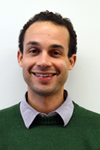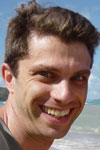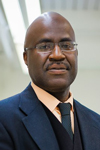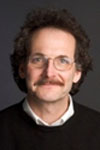Collaborators
 Mark Raymond Buckley
Mark Raymond Buckley
Mark Raymond Buckley, Ph.D.
Department of Biomedical Engineering, University of Rochester
Research Focus: Viscoelasticity in soft biological tissues; Soft tissue aging, disease and repair
Bio
Mark Buckley received his PhD in physics from Cornell University in 2010 and worked under Dr. Louis Soslowsky as a post-doctoral fellow at the University of Pennsylvania from 2010-2012. He joined the faculty of the Department of Biomedical Engineering at the University of Rochester in January of 2013. He has co-authored 16 publications on diverse topics ranging from three-dimensional tracking of swimming bacteria to the mechanical properties of cartilage under shear loading. Dr. Buckley is currently interested in “viscoelastic” soft biological tissues like cartilage and tendon that exhibit both fluid- and solid-like mechanical properties. His research emphasizes finding ways to control and exploit these complex properties to diagnose damage and disease, guide rehabilitation protocols and evaluate treatment and repair strategies in these tissues.
Steven Day

Steven Day, Ph.D.
Chair, Biomedical Engineering, Rochester Institute of Technology
Research Focus: Experimental and Computational Fluid Mechanics
Bio
Dr. Steven Day joined the Mechanical Engineering department at the Rochester Institute of Technology, Rochester, NY in the fall of 2005 as an assistant professor. After completing a BS in Mechanical Engineering at the University of Virginia, Dr. Day attended the von Karman Institute for Fluid Dynamics in Belgium and graduated from the program in Experimental and Applied Fluid Mechanics. He later returned to the University of Virginia and completed his PhD in Mechanical and Aerospace Engineering.
Dr. Day’s research applies methods in experimental and computational fluid mechanics to a wide range of applied and biological flows. Past studies have included the analysis of naturally occurring biomechanical systems (multiple lung bifurcations), engineered systems (supersonic combustion engines), and the design and testing of biomedical devices (artificial heart pumps). During his first year of postgraduate research in Belgium, Dr. Day used a laser based system to study the flow through lung bifurcations. At the University of Virginia, his research focused on the development of a state-of-the-art implantable blood pump. On this project, he worked with a team of faculty and students from the Engineering and Medical Departments at UVa, as well as collaborators at the Utah Artificial Heart Institute at the University of Utah and industry partner MedQuest, Inc. His dissertation focused on experimental measurements of the pump performance and internal fluid dynamics and he contributed to published research on the computational modeling, electro/mechanical design, and physiological modeling of the device. Most recently, Dr. Day collaborated with a group of Evolutionary Biologists and experts in Biomechanics at the University of California, Davis on a series of studies involving the complex application of fluid dynamics to suction feeding in fish. All of these novel collaborative efforts effectively cross the traditional boundaries between the basic, medical, and applied sciences. At RIT, Dr. Day will continue work on these and is excited to contribute to new projects that involve the application of engineering methods to complex biological systems and bring together scientists from varied disciplines.
In the classroom and laboratory, Dr. Day strives to promote critical thinking, and is looking forward to teaching courses in fluids and thermal sciences, bioengineering, and experimental methods. Dr. Day has worked with both undergraduate and graduate students throughout his research career and plans to continue to involve students in his research and is eager to participate in senior design projects and guide independent student research.
 Marvin Doyley
Marvin Doyley
Marvin Doyle, Ph.D.
Electrical and Computer Engineering, University of Rochester
Research Focus: Therapeutic and diagnostic imaging using optical, magnetic resonance, and ultrasound imaging
Bio
Dr. Doyley received his Bsc in applied physics at Brunel University in Uxbridge Middlesex, UK. He then earned his doctorate in biophysics at the University of London: Institute of Cancer Research. His thesis, An Investigation into Methods for Improving the Clinical Usefulness of Elastography, was supervised by Dr. Bamber. Dr. Doyley did his post-doctoral research at Erasmus University in the Netherlands, developing an online intravascular ultrasound elasticity imaging system for characterizing the composition of different plaque types in the catheterization laboratory.
 Daniel Phillips
Daniel Phillips
Daniel B. Phillips, Ph.D.
Electrical Engineering, Rochester Institute of Technology
Research Focus: Embedded systems, Biomedical instrumentation and signal processing, Assistive device technology, Human physiology, Advanced applied math techniques
Bio
Dr. Phillips is a P.I, and key collaborator in the Cardiovascular Engineering Lab. He is the Director of the Biomedical Engineering Program at the Rochester Institute of Technology, and an associate professor. Dr. Phillips’ main research interests are related to processing of complex biomedical signals for the purposes of developing and enhancing technologies for assistive devices with the goal of improving clinical diagnosis, treatment and rehabilitation. Areas of expertise and experience include embedded systems hardware/software, medical monitoring systems, biomedical ultrasound and applied physiology. His clinical collaborations include neurology, cardiology, surgery and anesthesiology. Dr. Phillips is a co-investigator of two major projects in the Cardiovascular engineering Lab and has helped set up a relationship between the lab and biomedical students, offering a unique experience for his pupils.